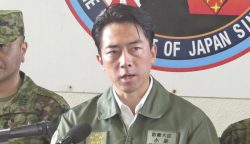
A U.S. nuclear-powered aircraft carrier berthed at U.S. Yokosuka Naval Base in Kanagawa Prefecture in May 2017.
18:15 JST, February 18, 2021
TOKYO/WASHINGTON — The United States has accepted a Japanese proposal that Japan’s share of the cost of stationing U.S. troops will remain unchanged for one year. While this has given Japan some breathing room, tougher negotiations lie in store before the current extension expires in 2022. Japan will likely face further demands to boost its defense-related spending.
“We were able to reach a necessary agreement during repeated negotiations held during exceptional circumstances and under time constraints,” a relieved-looking Defense Minister Nobuo Kishi said to reporters on Wednesday.
Japan’s share of the so-called sympathy budget is usually reviewed every five years. The current agreement expires this fiscal year, which ends in March.
Swiftly sealing this extension less than one month after U.S. President Joe Biden was sworn in indicates the importance the new U.S. administration places on ties with allies as it crafts a strategy for dealing with China.
Biden’s approach “will remove a major source of tension in alliances and enable focusing on common threats,” Bruce Klingner, a senior research fellow at The Heritage Foundation think tank, told The Yomiuri Shimbun.
According to sources, Donna Welton, a U.S. State Department senior advisor for security negotiations and agreements, became irritated when negotiations were in the headlines during the administration of President Donald Trump. “If the president heard how talks were progressing, he may make unreasonable demands. She dreaded that,” a diplomatic source said.
The Trump administration was irked by the fact that Japan spent only 0.9% of its gross domestic product on defense expenses in fiscal 2019: South Korea spent about 2.44%.
The Biden administration also has indicated it wants to work with its allies to counter various threats. “It’s possible Japan will come under continued pressure to increase its defense spending and the sympathy budget,” a senior Foreign Ministry source said, expressing a view shared within the Japanese government.
The government believes a hefty increase in defense spending will be financially impossible. Consequently, the government plans to allocate the defense budget with a priority on fields such as more stringent monitoring of space by satellites, to illustrate in future negotiations what contributions Japan is making to the bilateral alliance.
Investment, not a cost
Washington’s acceptance of the agreement to keep host nation support at the current level for the time being also is aimed at rebuilding ties with U.S. allies including Japan, as the United States pieces together a strategy for dealing with China.
As a one-year extension has now been agreed, next, the U.S. government plans to hold future discussions on host nation support in parallel with deeper negotiations with the Japanese government on strengthening Japan-U.S. defense capabilities, Japan’s contribution to the alliance, and the realignment of U.S. military forces.
Biden has taken a stance of showing consideration for the positions of U.S. allies. He held telephone talks with leaders of several European nations soon after being inaugurated in a move aimed at solidifying ties with North Atlantic Treaty Organization members. U.S. news network CNN also has reported that Washington and Seoul are close to a new cost-sharing agreement for U.S. forces in South Korea.
All these steps indicate the United States is keen to work closely with its allies as it keeps a wary eye on China.
“The combined weight of U.S. allies and partners can shape China’s choices across all domains … Establishing clear-eyed coexistence with China will be challenging under any conditions, but it will be virtually impossible without help,” Jake Sullivan and Kurt Campbell wrote in a joint article published in a magazine about foreign policy and global affairs in 2019. Sullivan is now a national security advisor, and Campbell is the U.S. National Security Council’s coordinator for the Indo-Pacific.
The Trump administration “alienated many of the United States’ traditional friends … with demands of payment for military bases … The United States needs to get back to seeing alliances as assets to be invested in, rather than costs to be cut.”
ROK cooperation eyed?
U.S. finances are already very stretched. The Trump administration boosted defense spending each year, and the defense budget reached about $650 billion (about ¥68 trillion) in fiscal 2019, according to Japan’s defense white paper.
The Biden administration has made clear that it will focus on domestic issues including steps to combat the novel coronavirus pandemic and bolster the medical care system. At a time when China’s defense expenditure is growing, the United States can barely afford to boost its military budget. Deep down, Washington likely wants to press its allies to shoulder a greater share of this financial burden. Despite this, the fact that the United States concluded negotiations to keep the cost-sharing deal at its current level demonstrates a preference for deepening security cooperation over harming relations with its allies. The Biden administration is expected to next complete negotiations with South Korea and then urge increased trilateral cooperation among Tokyo, Washington and Seoul.
Top Articles in Politics
-

Japan PM Takaichi’s Cabinet Resigns en Masse
-

Sanae Takaichi Elected Prime Minister of Japan; Keeps All Cabinet Appointees from Previous Term
-

Japan’s Govt to Submit Road Map for Growth Strategy in March, PM Takaichi to Announce in Upcoming Policy Speech
-

LDP Wins Historic Landslide Victory
-

LDP Wins Landslide Victory, Secures Single-party Majority; Ruling Coalition with JIP Poised to Secure Over 300 seats (UPDATE 1)
JN ACCESS RANKING
-

Japan PM Takaichi’s Cabinet Resigns en Masse
-

Japan Institute to Use Domestic Commercial Optical Lattice Clock to Set Japan Standard Time
-

Israeli Ambassador to Japan Speaks about Japan’s Role in the Reconstruction of Gaza
-

Man Infected with Measles Reportedly Dined at Restaurant in Tokyo Station
-

Videos Plagiarized, Reposted with False Subtitles Claiming ‘Ryukyu Belongs to China’; Anti-China False Information Also Posted in Japan






















